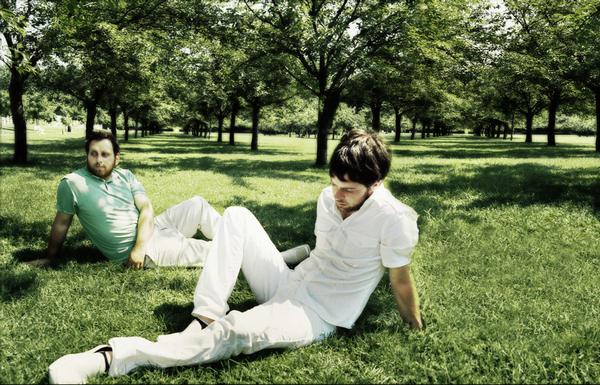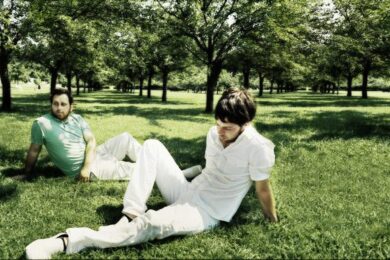My hotmail account was recently hacked. It was used to send out a spam email offering ‘great electornic [sic] products’ at a price that ‘is a surprising happiness to you’. My reaction to this digital identity theft bordered on the luddite as I contemplated destroying all technology within a certain radius in order to maintain some semblance of personal privacy.
Technology frustrates us all at times, but it’s something that Canadian duo the Junior Boys have been firmly embracing since Last Exit, their 2004 debut LP. Its melancholic blend of electronic pop, 2-step and R&B earned high praise from various indie-leaning media outlets. So This Is Goodbye, their house-infused 2006 follow-up, pulled off a similar trick and led to even greater acclaim for Jeremy Greenspan and Matt Didemus, who now make up the band.
Since then, Didemus has married, relocated to Berlin and essentially turned JBs into a full-blown international act. Greenspan, meanwhile, developed a love of Canadian animator Norman McLaren and borrowed the title of one of his short films for the Junior Boys latest LP, Begone Dull Care.
We recently spoke to Greenspan about the new record, only to learn why he doesn’t care much for the use of computers in modern dance music and how it just might be possible to recreate soft rock drumming with industrial beats.
Why did you name the album after an animated short film from 1949?
Jeremy Greenspan: “It’s basically a long story. Essentially I got into this animator, Norman McLaren, and I sort of wanted to make an album that was about the process of working and about the process of making this album. I became more and more interested in McLaren because I loved his movies and also because the more I learned about him and his methods and his ideas, the more kinship I felt with him. So it allowed me to make an album largely about myself through using another person as an ideal, as a thing to hang my ideas on.”
What specifically draws you to McLaren?
JG: “One of the obvious ones being of course that he’s a Canadian, but much more beyond that. He made art that was highly technologically driven.”
You’ve previously claimed that technology plays a large part in the Junior Boys music.
JG: “Exactly. I always think that the conditions upon which you create your music creates the music much more than a lot of musicians feel comfortable admitting. The instruments you choose, the environment you find yourself in, all that kind of stuff. So we’ve always wanted to try and create a condition that allowed the technology or the instruments to find their own voice. And I think McLaren had a similar notion.”
Would you recommend McLaren’s films to people who learn of him through your record?
JG: “I’m aware that it’s a little bit obtuse to be referencing a guy who’s not that well known. But the thing about McLaren is that he’s a populist. He was very experimental, but there’s a sort of, what I like to think, a sort of Canadian experimentalism. It’s not confrontational. He has a sort of politeness about his avant-garde tendencies. So anyone can watch it.”
Do you think you create a Canadian brand of electronic music?
JG: “I’ve always thought that I’m deeply committed to a type of experimental pop, you know? Making music with new technologies and trying new ideas and trying to expand your sonic pallet as much as possible. But I’ve never been, I’ve never thought of myself, as elitist, I hope not. I’ve never thought that we made music that isn’t accessible. The idea was to make pop music. For me, the most important aspect of music is subtlety, and so, I think that’s what’s important. Making pop music these days, subtlety is not valued.”
What about in the deeper corners of the dance world? Do you think subtlety is still valued there?
JG: “For me, dance music is increasingly uninteresting. There’s such little joy in the creation of it, you’ll find that people can become methodical to the point of . . . there’s professionalism in it, a sense of formula. I think a lot of it has to do with the fact that what’s valued sonically is what’s clean and what’s loud. You just hear these things and even the distortion sounds that they use are pre-packaged, pre-set. I think part of the problem is people who make music exclusively on computers are relying on decisions that are made for them by some programmer. The computer is best used as an arrangement tool, as an editing tool. But as a means for creating sound, it can be far too limitless. There are too many choices you can make and so few of them are good because it’s so quick to do something formulaic on a computer, it’s so fast and devoid of any experimentation.”
Is this an attitude that’s developed over time or have you always thought this?
JG: “I’ve had it for a long time but I think the trends in music have solidified it over time. Fortunately, in dance music, there are still people who are doing good stuff and there are some good records made. But I think the overall trend is not towards experimentation and not towards subtlety. I go to dance clubs these days and what’s popular, I can’t listen [to]. It just seems so pre-programmed, so pre-packaged; the music sounds to me like Motley Crue.”
Cock rock?
JG: “It basically is cock rock. And everyone looks like cock rockers and they all act like cock rockers and I can’t identify with it.”
You’re still based in Canada, Matt’s in Berlin. You’ve both been flying back and forth between continents to work on the album. Did you ever consider cutting back on the mileage and sending files back and forth over the internet?
JG: “We thought at first that we might want to do that but when the reality of that started looming and how unpleasant that seemed, you know, I just figured fuck it. It’s not really that big of a deal to be on a plane once in a while.”
So the face-to-face element was important to you?
JG: “Yeah, I think so. The irony is that when we’re face-to-face we don’t work together necessarily that much. But I think there’s just, he’ll do some work and I’ll do some work and that’s just how we’ve always done it. Anything else just doesn’t seem quite right.”
You’ve claimed in other interviews that the rhythms on the new record were influenced by a drummer named Jeff Porcaro. Is that true?
JG: “Yeah, there’s these types of drummers from the 1970s that I got really into, like Jeff Procaro and Bernard Purdie and Steve Gadd. They’re kind of like these famous session drummers from the ‘70s and ‘80s, and they all have this incredibly methodically, drum machine steadiness to them.”
They played for the likes of Steely Dan, right?
JG: "Exactly, these are the guys who played with like Boz Scaggs and Michael Jackson.”
So it’s soft rock drumming?
JG: “Yeah, basically it’s all drumming that has a light touch, the steadiness with a light touch. I was like ‘How do you do that with drum machines?’ which was kind of a challenge. But that’s sort of what I wanted to do. Again, I love, sonically, drum machines. I wanted them to have a soft touch but I still wanted them to sound very synthetic. Sonically, when it comes to drums, my favourite kind of drum sounds are things like Front 242, like these sort of really industrial drum sounds. So it’s how do I take that sonically and give it a light touch.”



